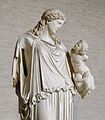Plutos (mythology)

Pluto ( Greek Πλοῦτος " wealth ", "wealth"; Latin Plutus ) is in Greek mythology , first the personification of wealth, later the god of coming out of the earth riches, including grain inventories, Erdschätze and the germinating plants.
Plutos is not to be confused with the god of the underworld Pluton / Pluto (the Roman equivalent of Hades ), although both may have the same origins. In later times, however, the two gods are occasionally equated.
mythology
According to legend, Plutus was the son of Demeter and Iasion . Demeter fell in love with the young man Iasion at the wedding of Kadmos and Harmonia in Crete . They gave plenty of nectar and then secretly went out from the festival to a field that had been plowed three times. There Demeter gave himself up to her lover. After the return, the clinging soil revealed to Zeus what had happened. Soon after this deed, Zeus struck Iasion with lightning.
Because he distributed his gifts at random, the Greeks suspected that Plutus had been blinded by Zeus (while killing his father) .
Plutos was especially venerated in Eleusis . In the context of the mysteries of Eleusis , Plutos was the divine child, the childlike doppelganger of Pluton.
Effect in art
In the fine arts, Plutos is often depicted as a boy with a cornucopia . Other representations, such as the famous bronze statue of Kephisodotos the Elder , which has come down to us in several Roman marble copies, show Plutos as a little boy on the arm of the goddess of peace Eirene , which symbolizes the burgeoning prosperity in times of peace, or on the arms of the goddess of fate Tyche .
Plutos is the title character of the comedy Πλοῦτος ( The Wealth ) by Aristophanes . He is one of the main characters in Lukian's dialogue Τίμων (Timon) .
Also Dante Alighieri leaves Pluto in his Divine Comedy occur. In the seventh song of the inferno , Plutos is represented as a wolf-like creature that guards the spendthrifts and stingy in the fourth circle of hell. However, since the description of Pluto is only brief and vague, it is possible that Dante also confused or equated Plutos with Pluton.
Statue of Eirene with Plutos
Plutos in the fourth circle of hell, illustration by Gustave Doré
See also
literature
- Theodor Eisele : Plutos . In: Wilhelm Heinrich Roscher (Hrsg.): Detailed lexicon of Greek and Roman mythology . Volume 3.2, Leipzig 1909, Sp. 2572-2584 ( digitized version ).
- Hans von Geisau : Plutos . In: The Little Pauly . Vol. 4, 1972, Col. 957-958.


